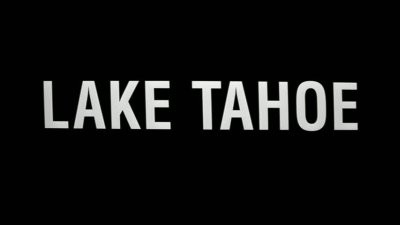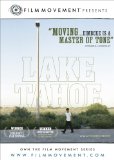| Reviews & Columns |
|
Reviews DVD TV on DVD Blu-ray 4K UHD International DVDs In Theaters Reviews by Studio Video Games Features Collector Series DVDs Easter Egg Database Interviews DVD Talk Radio Feature Articles Columns Anime Talk DVD Savant Horror DVDs The M.O.D. Squad Art House HD Talk Silent DVD
|
DVD Talk Forum |
|
|
| Resources |
|
DVD Price Search Customer Service #'s RCE Info Links |
|
Columns
|
|
|
Lake Tahoe

In Lake Tahoe, director and co-writer Fernando Eimbcke displays a gentle but controlled sensibility in telling a quiet story that has an almost universal resonance. To clear up confusion straight away, I should point out to those interested that the film's title has no relation to its locale. Lake Tahoe is set firmly in contemporary Mexico, although I can't be more specific than that. Nevertheless, there is logic behind the title, which I won't explain here. Eimbcke's film won major prizes at the Berlin and Cartegena Film Festivals, and at the Mexican Academy Awards (the Ariels), yet it only had a limited theatrical release in North America. We are lucky that Film Movement snapped up the DVD rights of this fine film.
A young teenager named Juan (Diego Catano) crashes his little red Nissan sedan into a telephone pole on the outskirts of town. He spends the better part of the day trying to find a new distributor harness so he can restart the car, which is otherwise not terribly damaged. He patiently contends with Don Heber (Hector Herrera), a retired mechanic, and his pet mastiff; Lucia (Daniela Valentine), a female clerk at an auto shop; and her young martial-arts obsessed colleague, David (Juan Carlos Lara II), in trying to get his car fixed. When Juan takes a break from these proceedings to check in at home, he finds his younger brother Joaquin (Yemil Sefani) playing in a tent erected in their sandy yard, and their mother sulking and smoking in the bathtub. We come to understand at about this time that Juan's father has recently died. This set of circumstances drives Juan once again from the house, determined to get his car fixed and impose some sort of order on his life.
The film opens with static, formally-composed shots of Juan's neighborhood, spliced with short interstitial moments of black, blank screen. This device allows the imagery to sink in, and forces a moment of consideration on the part of the viewer. Since there is rather limited dialogue in the film, these spaces are important. For some, this film will be far too slow. But I found a finely-tuned tension to be present throughout, especially in Juan's interactions with the other characters.
Juan is a quiet boy, likely made more so by the loss of his father. Lucia, the clerk at the auto parts shop, is Juan's age - too young, in many ways, to have given birth to her infant son Fidel. She loves music and clearly has ambitions beyond her present station in life. At one point, she places her wailing boy in Juan's arms; when her son promptly falls asleep, something stirs in her - a sense of trust that we know Juan may not come to understand for many years. Later in the film, when Juan and Lucia fall into one another's arms, there is a sense that fate is at work. Awkward, nascent teenage romance has rarely been handled so frankly and fondly.
More important in the total scope of Lake Tahoe, however, is the relationship between Juan and his younger brother Joaquin. About seven or eight, Joaquin spends much of the film playing in a tent in their yard. With their mother nearly catatonic with grief, Juan is faced with a new level of responsibility toward his brother. The scenes in which he demonstrates that he is aware of and equipped for the task are easily the most moving in the film.
Lake Tahoe feels less scripted than storyboarded. The camera takes us through the story with more authority than the dialogue does. Each shot is part of a series of shots; each series of shots is part of a longer cohesive sequence; and so on. The film feels simultaneously hermetic and organic. In my view, its visual and editorial composition represents a masterwork of storytelling economy, especially when taken together with the very limited dialogue. At a mere 81 minutes, Lake Tahoe feels fuller and richer than its short length might suggest.
In service of this achievement, Eimbcke wisely leaves out ancillary expository details - the manner of Juan's father's death, for example, and the question of a memorial service. The standard formalities associated with deaths in the family are hidden in Lake Tahoe, because this sort of irrelevant data would weigh down the mood-driven character dynamics and distract the audience from the film's heart.
That heart is Juan, and we follow him closely. His behavior, more than his words, is what interests us. Diego Catana, playing Juan, carries the entire film and is simply remarkable. He invests the role with an ego-free awkwardness endemic in many young men of that age. It's a seemingly effortless performance of a sort we almost never see from teenaged actors.
The DVD
The Video
Film Movement has released Lake Tahoe as "Year 7, Film 3." Film Movement is a pretty awesome subscription service that seeks out well-received but distributor-less films from film festivals around the world, releasing one DVD per month containing a feature and a short. The enhanced 2.35:1 transfer maintains the bright, high-summer white, sky blue, and green palette of the photography. The picture is generally solid, with good blacks during the nighttime scenes, although longer shots occasionally suffer from softness or a slightly blurred look.
The Sound
The stereo Spanish-language track is perfectly clear, even thought it's a no-frills mix. Music is utilized rarely, and is mostly, if not all, diagetic. Dialogue is clear, even when it's quiet, which is often the case.
The Extras
The main extra is the inclusion of the unrelated short film Noodles (5:42), directed by Jordan Feldman, which looks good but is rather forgettable. There are also filmmaker biographies, the feature's theatrical trailer, and trailers for other Film Movement releases.
Final Thoughts
Lake Tahoe is a quiet film whose methods and moods bring to mind the work of Abbas Kiarostami and Michelangelo Antonioni. Co-writer and director Fernando Eimbcke shows that he has the capacity to grow into a filmmaker whose work is as indelible as that of those giants. Lake Tahoe is an impressive, restrained, carefully controlled observation of teenage experience that deserves a lasting reputation. Highly recommended.
|
| Popular Reviews |
| Sponsored Links |
|
|
| Sponsored Links |
|
|
| Release List | Reviews | Shop | Newsletter | Forum | DVD Giveaways | Blu-Ray | Advertise |
|
Copyright 2024 DVDTalk.com All Rights Reserved. Legal Info, Privacy Policy, Terms of Use,
Manage Preferences,
Your Privacy Choices | |||||||














